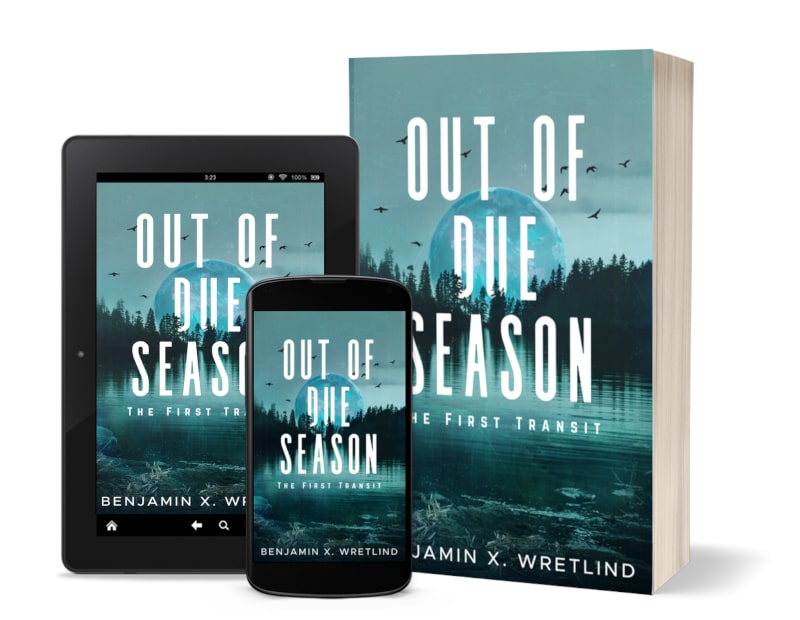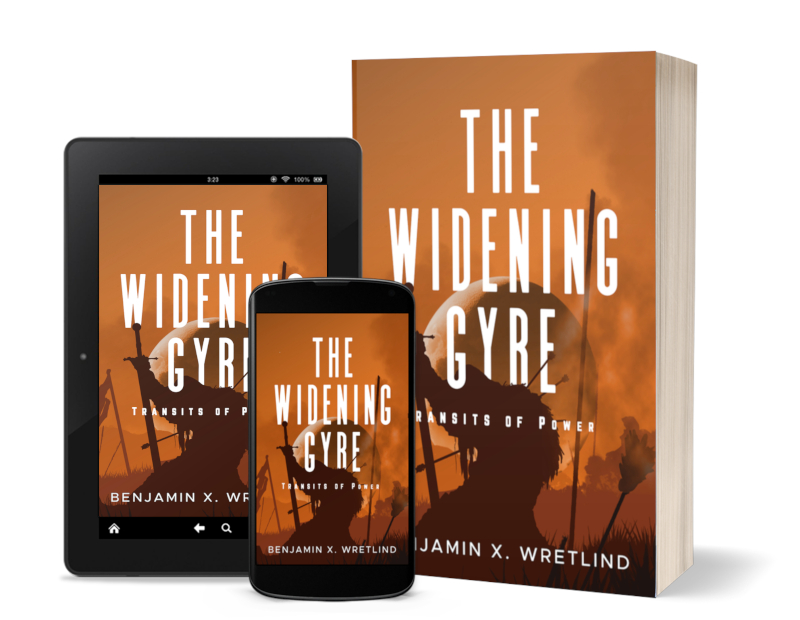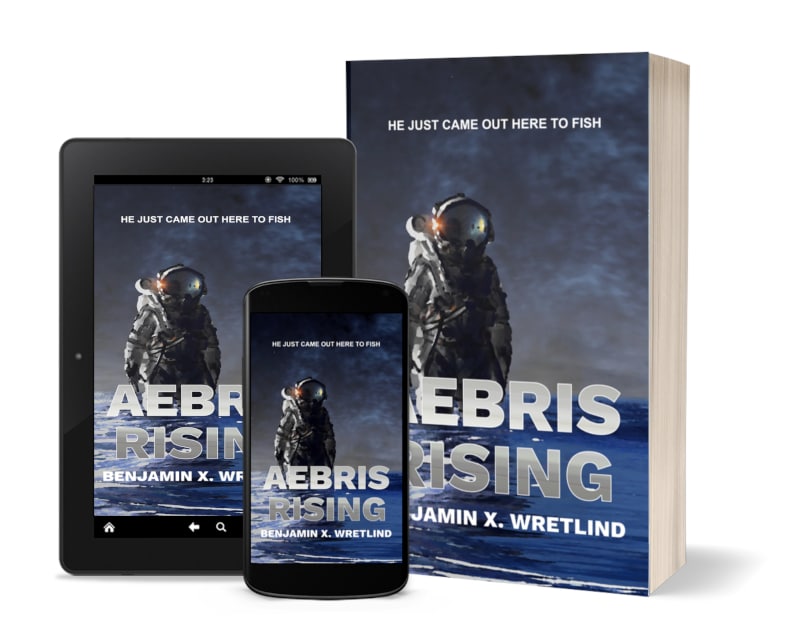The following excerpt is from Out of Due Season: The First Transit, which was released on February 8, 2022.
CHAPTER ONE
“How long have they been down there?”
“I’d say about three weeks.”
“This won’t be pretty.” Christopher Allen looked over the dark water at an unanchored inflatable Zodiac. Three recovery specialists attempted to snag an amorphous shape with a twelve-foot pike pole near the middle of a lake. The shape—a bloated body, blue-green and gray—bobbed up and down on the water like discarded whale blubber whacked off with a mincing knife, then left in the sun to rot.
“Thing is, we never would have known if it weren’t for that floater out there.”
“God bless the little miracles.” Allen, all of six feet four inches, wiry with a tuft of red hair poking out of a black ball cap, put his hand on Bradley Clarke’s shoulder. The two men, both in their mid-fifties, had been inseparable over the past three years as they bounced from lake to sea, river to canyon, pond to glacier leading a team of recovery specialists picking up the remains of people who either had poor judgment or poor luck. It was difficult to tell, in some cases. It was also difficult to tell which of the two leaders was in charge.
A few small waves drifted to the grass-mottled shore as the light of the afternoon ebbed away. Algae bobbed up and down like a puke green shirt in the wind. The temperature had been steady most of the day—chilly—while clouds hung in the sky in ways elephants don’t, even if they did look like elephants to those trying to find shapes in clouds. They were large and gray enough, although in the Pacific Northwest this was all too common.
“What are you thinking?” Clarke picked at something between his teeth with a toothpick.
“It’s gloomy.” Allen remained silent for a moment, rubbed his nose, then sighed. Marker buoys bobbed up and down on the water near the Zodiac. “How many did the divers find so far?”
“Twenty-nine, but it’s blackwater so unless the bodies are grouped together like a forest of souls, we won’t get an accurate count until we scrape the bottom.”
“All upright?”
“So far. The feet are fitted into weighted shoes, except for our guy out there. Might have slipped them off for comfort.”
Allen shook his head. Fitted into weighted shoes. It was too neat. He feared there were more than twenty-nine bodies under the water. This would not be a clean recovery.
The man working the pike pole pulled the floater to the side of the Zodiac. From their distance on the shore, it was difficult to tell if the body was male, but its appearance gave the impression of a heavyset man despite the bloating of the body. A sudden flutter of activity and a few shouts of expletives caused Clarke to raise his radio to his mouth. “Recovery One, report.”
The radio hissed. “Body’s falling apart. Bet they’ve been down a long time. Pulled a chunk of flesh off an arm.”
Clarke clicked a button. “Use a tarp and litter.”
“We’re getting it ready right now.”
A drop of cold rain hit Allen’s arm. “Thoughts?”
Clarke gazed out over the water. His right eye twitched, a sign to Allen that his partner was deep in thought going through as many scenarios as possible. He ran a calloused hand over a balding pate. “Not an organized crime thing. Too many bodies dumped at what seems to be the same time. Suicide pact, maybe, but it seems like a stupid way to go all at once. That many people, too. There would probably be reports of missing people over the past few weeks pouring in. None of the towns nearby reported anything out of the ordinary.”
Allen grunted. “What is ordinary out here?”
“Pot heads and wilderness junkies. A few loggers. Never was comfortable on this side of Olympia.”
The two were silent as the work continued on the water in front of them.
After a few minutes, Allen spoke. “How long before we get help?”
This was a sore point for the recovery team. They were state contractors, and their willingness to deploy and work in remote areas had allowed them a bit of latitude with the bureaucracy and paperwork that came with recovery efforts previously handled by local sheriffs. That was the benefit. The assumption of the powers that be and the powers that funded their operation, though, was that the team could handle most recoveries on their own and let local jurisdictions deal with their own problems, problems that had escalated in recent months to include looting, murder, kidnapping and a general loss of all things civil. It was obvious, however, that this recovery was different, and while the location was remote, it was not too far removed from the logging roads any help would use when they brought in their trucks towing all the right equipment.
In addition, the stranger the recovery, the more likely the big dogs would want in near the beginning. One or two of them might even pack hiking shoes. The media implications on their own were astounding, and tragedies like this are what drove budget increases.
“We might see a crew from Seattle in a day,” Clarke said. “Under the circumstances, I think it may be a good thing we have to wait. Too many people to get in the way. The divers will have surveyed enough by tomorrow, so we can probably get a good bit of the work done before the barriers go up and the paperwork starts.”
“So, what does that leave us?”
Clarke looked pensively at the marshy shoreline of the lake. “Don’t know. According to satellite recon, there’s a camp about three miles down the river. Probably hippies who think it’s 1972 and running away from the Big Bad. Don’t know if there’s anyone home, though.”
“The Big Bad?”
“Yeah. You know, the ‘gubmint’ as they say. Anyway, I sent Virgil and Tyler down there to see if they heard anything. The nearest other settlement is thirty-odd miles near the coast.”
Allen looked to his left toward the mouth of the river, bounded on both sides by Sitka spruce, western hemlock, mosses, ferns and lichens festooning the tree trunks and branches. “They walk?”
“Through that? No.” Clarke snorted once and spit something into the water. “They’re in a canoe.”
—
Virgil Timmons looked down at a GPS unit mounted to the bow deck. Thirteen years as a Navy a-ganger on a submarine, two more as a fire fighter, then a stint as a prison guard, the one thing he was never good at was navigating the open air. If confined to a smoke-filled, darkened passageway four feet wide and six feet tall looking for a piece of lint, no problem. Standing in a large open field on a sunny day looking for a barn, however, gave him fits. Thanks to GPS, he could fake it. “There should be a dock ahead.”
Draped in fog, the visibility on the river was little more than twenty feet. Strands of mist swirled around the canoe as the two rhythmically sliced the water with their oars.
“How could anyone live in a place like this?” Tyler Ramos wrinkled his face, then put his oar back in the water. “You’d have to have nerves of steel to deal with all the silence.”
“Smoke enough weed or eat enough mushrooms and it doesn’t seem so bad.”
“You think we’ll find anyone?” Tyler asked.
“I would have thought we’d hear Bob Dylan or some stoned kid playing Cat Stevens by now, so unless they’re sleeping, no.”
“Getting a little dated in your references, there.”
“Blame my parents.”
Virgil and Tyler simultaneously stopped rowing and let the canoe drift. The gray clouds merged with the mist along the water and the dense forest on either side, lending a confined feel to the scene. Old-growth trees crowded the banks of the river. A few logs, rotted and covered in mosses, jutted out.
“At least this isn’t swift water. Why couldn’t we get the Zodiac again?”
Virgil looked behind the canoe and then forward again, ignoring the question. As river water gently lapped at the side of the canoe, the uneven lines of an old dock materialized along a bank to the right. Wordlessly, the two recovery specialists drifted toward it until they were close enough to throw out a mooring line and tie off. Above the dock, just past the edge of the river, they barely made out a few poorly constructed buildings. The sun sat at the perfect angle to merge shadow with sky, a natural effect that created spooky where there was already eerie. Virgil hopped out of the canoe first. His hand instinctively grabbed onto the butt of his holstered side arm.
“Gonna shoot a hippie?” Tyler said in a low voice as he hopped onto the deck behind Virgil. The wood creaked in response to their combined weight, but aside from a few deep breaths taken in the cold air and a chirp or two from deep in the forest, there was no other sound.
Virgil ignored his partner once more and brought a radio to his mouth. “Base, Recovery Two.”
Clarke’s voice cracked back. “Recovery Two, Base. Report.”
“We’re on a dock right where the camp should be, but from here it looks abandoned.”
“Recon and report back. You don’t want to stay too long and lose light.”
“Roger. Recovery Two out.” Virgil clipped his radio to his belt as Tyler drew a heavy-duty flashlight. The two walked tentatively forward until they were off the dock and standing in mud. As they approached the camp, abandonment seemed the most likely scenario. There were adobe huts, wooden shacks and dirty canvas tents that stretched out on the shore of the river and into poorly cleared areas of the forest. The buildings were held together poorly, some with nails, some with rope, some with nothing more than the weight of four walls leaning against each other. The muddy walkways snaked through the structures with no pattern, cutting right, then left, then right again. Weeds grew in congested numbers between the buildings, in gutters, and poked through cheaply constructed front porches.
The silence overwhelmed, and Virgil grew uncomfortable. After five minutes, the two stopped. They scanned the empty walkways and peered into a few open doorways and windows, looking for signs of life. Finally, Virgil took a few steps forward. He was aware that his heart echoed emptiness and loss. Life had existed here, but not in any form that would give answers. Only questions.
The two walked up to a wooden shack on their left, its roof caved in. As Tyler shone his flashlight, Virgil peered through the hole that may have served as a window. A fine layer of dust covered everything, from a makeshift table to folding lawn chairs to a bed of tattered blankets in the corner.
“Anything of interest?” Tyler asked, breaking the silence.
“A lot of nothing,” Virgil said, still peering through the window. “It looks like our campers weren’t keen on material possessions. Either that or they took everything with them.”
The two walked away from the building and over to another as a light rain began to fall. Inside, they found much of the same: a few table settings, beds made of nothing more than rags, and the remnants of a few meals. On a board holding up what may have been part of a door jamb, there was a strange carving, six perpendicular lines like three off-center Xs. Aside from that, there were few clues about the inhabitants of this camp, and that meant there was little they could report back. Every building they examined was different. The tents smelled the worst while the wooden shacks stood precipitously on their weak foundations. Whatever happened to the people, it was not catastrophic, but it was weird.
“Hello?” Tyler called out. Lapping water and the chirps of a few birds replied, but no one else. “Hello?”
They both stood ankle deep in mud for another minute, looking, listening. Finally, Virgil unclipped his radio. “Base, Recovery Two.”
“Recovery Two, Base. Report.”
“There’s nothing here. Seems to be about twenty buildings and a few tents, all run down.”
“Any sign of life?”
Virgil swung his head around right then left, taking in the scene one more time. Tyler had stepped onto a few boards that might have been a porch and was playing his flashlight around inside a building. His light stopped moving. He raised his right hand, a signal for Virgil.
“Base, stand by.”
“Roger. Standing by.”
Virgil returned his radio to his belt and followed Tyler onto the porch. “What do you see?”
Tyler’s light illuminated a table with an old reel-to-reel tape deck sitting in the middle. A red light blinked as the tape wound with the click-click-click of a full take-up reel and empty feed.
—
From inside the command tent, the rain sounded like a deluge worthy of Noah. Outside, however, it sounded more like a steady stream of tiny droplets equivalent to a shower with low water pressure. It was, as Allen’s wife, Marissa, would say, “annoying.” Rain was okay in moderation and only then if it was much warmer.
Allen and Clarke sat around a foldable table. They pored over a letter found inside a waterproof freezer bag tied around the floater’s body, which had been hoisted out of the water on a tarp and onto a Stokes litter. The victim—or what was left—was secured inside a water recovery body bag in a morgue tent set up on the lake shore about a hundred yards from any sleeping tent. Since darkness had descended and the rain started, the body would be alone in the cold tent until the morning when a team would dive down to survey the rest of the “forest of souls,” a moniker Clarke had applied to the scene but one that hadn’t set well with Allen.
The letter remained inside the bag to preserve any evidence, but the handwritten words were clear enough. Allen transcribed on a notepad as Clarke read aloud.
“‘I don’t expect to live more than another few hours. As The One has directed, I am letting the WORLD know what I am thinking. The reasons we did what we did are not for me to explain. Those words belong to The One only as he is the Prophet. We returned here because the WORLD wants to kill us, wants to drive us out into the Valley of Death and put a bullet in our collective brains. This cannot be our fate.’”
Clarke stopped reading and looked up. “The word ‘WORLD’ is capitalized throughout the letter.”
Allen nodded and with a wave of his left hand prompted Clarke to continue.
“‘I am at a point right now so embittered against the WORLD that I don’t know why I am writing this. Someone who finds it will believe I was crazy or believe The One drove us to this action, but that is not the case. Everything good that happens to the WORLD is under attack. As I write this, I can picture some deranged fascist government person deciding on his or her own that it should be shredded before anyone else has time to hear the truth. The truth is this: the WORLD will burn, but we will live on in eternal bliss as The One has taught. He has made our paradise possible. He knew how mean the WORLD was, and I feel sorry for those who remain behind to read this. The WORLD will believe what it is told, not what is real.’”
Allen stopped writing. “The One. Conveniently ambiguous. Would be nice to put a name on this person.”
“Nutcase, apparently.” Clarke flipped the plastic bag over. “If the rest of the bodies have letters like this, we might get a break.”
“How so?”
“Well, if anything, we’ll have a record of why this happened.”
“What’s on the back of the letter?”
“Henry Wayne Backmon, 167.”
“One sixty-seven?” Allen pulled the letter across the table and looked at it closely. “What’s that number supposed to be?”
Clarke tapped the table a few times with his index finger as his right eye twitched. “I really hope it’s not what I think it is. If so, there are more than twenty-nine bodies to recover. Think we should get Talbert to see what he can dig up once the satellite is operational.”
Allen stood up, stretched, and stepped over to the entrance of the tent to peer outside. The team had set up five other tents along the shore to his right. To his left, a lonely light illuminated the morgue tent from the inside. What remained of Henry Backmon was out of the water.
Allen couldn’t help but wonder if this was something expected or planned. That the rest of the bodies were still planted on the bottom of the lake in weighted shoes made him curious if the floater had just been a lucky break. Maybe it was orchestrated. Did the rest of the bodies have letters or notes tied around their necks and share the same disgust at the world? Did any of them provide reasons this happened or name “The One?” At the very least, the letters would make identification of the bodies easier, and for the coroner’s office it would make notification of the next of kin possible. Clarke was right: they might get a break.
Two dive teams would head out in the morning and survey the lakebed. It was too late and too dark to dive safely. Until then, questions would fester. Perhaps there were only twenty-nine bodies, and “167” meant something entirely different. Perhaps it was the number of days Henry had been following this “One.” Maybe it was nothing at all. A sick feeling in his belly, however, told Allen they would eventually need more body bags.
Clarke spoke from inside the tent. “Ready to listen to the tape?”
Not really, thought Allen. He sighed and turned back to the table.
—
After Clarke headed to bed, Allen listened to the tape a second time and then a third. There was something in the words—if not the background noise—that reminded him if only briefly of the supposed “Death Tape” of Jim Jones. That tape, reportedly recorded during the mass suicide and murder at Jonestown in 1978, was something he had listened to a few times in his younger days. It was not a sick obsession with death but a desire to know how one man convinced others to drink potassium cyanide mixed into a vat of fruit punch and tranquilizers. Despite the debate over how many people were murdered at Jonestown versus how many people accepted the poison of their own free will, Allen’s desire to know focused more on the talent of persuasion that Jones held than anything else. If leadership can be defined as the art of influencing others to do something they would not normally do, then Jim Jones was a great leader.
So was Hitler, by that logic. Bad people can learn how to lead—or manipulate—which is really where the problems begin.
There was one big difference between the Jonestown tape and this one, however: the tape from Jonestown was filled with sounds of crying babies and young children upset at the “bitter taste” of the poison they were forced to drink. Thankfully, the tape they recovered from the camp had no such sounds.
In many other ways, however, this tape was too similar, and judging by the sound of the audience, the number of dead under the lake was likely much larger than they expected, if indeed the tape was their final message. The team originally planned to recover just one floating body, as dispatch had told them. When they found the others on a quick dive to see if there was a sunken boat or anyone else, it surprised them to find even more. They were more surprised when they learned there was a camp not too far away and they might get a lucky break if anyone saw or heard anything. However, the camp was abandoned with only this tape left behind, powered by a solar get up, as if there was enough sun to keep it alive. It seemed unrelated, but after pairing the letter on the body with the tape, what gnawed at Allen’s stomach since arriving was coming true.
He shivered at the thought of mass suicide and sat back in his folding chair at the table. The words of “The One” echoed in his head: “Well, everybody dies. Faith dies when people die. I haven’t seen anybody yet who didn’t die, and honestly, I’d like to choose my own kind of death for a change. I’m tired of being tormented to hell. Tired of it.”
Everybody dies.
Tired of it.
Allen looked toward the opening of the tent. It had stopped raining and most of the on-site recovery team had fallen asleep, fully prepared for the morning mission. It would be a heavy schedule: two dive teams of four each would head out on the Zodiac and survey what they could in a circular pattern. Marker buoys placed at the location of the other bodies would be the starting point, and while the deepest portion of the lake was just under a hundred feet, it was definitely blackwater. The forward dive team, who had counted the initial twenty-nine bodies, reported visibility of only a foot in the brightest of lights near the bottom. They would tether the dive pairs together and rotate with their relief on the surface. Thirty minutes down, rotate. Using a circular search pattern starting from the buoys in the middle of the lake, Clarke estimated it would take them from dawn to mid afternoon to perform the initial survey, barring any obstacles along the way. More divers would be ideal, but they were not prepared for this.
Each member of the team had recovered drowning victims before, but not all of them had encountered bodies as decomposed as Henry Backmon’s. It would not be easy to survey the scene, and he expected problems along the way. They desperately needed more divers, more Zodiacs, more tents, and more body bags. The media would find out soon enough, and that would create a fresh problem set. This would not be textbook. It would tax the twelve people on his team.
He was especially concerned about the rookie, Zachary Miller, the youngest member who had so far only pulled one body from water. The victim, a seventeen-year-old adrenaline junky, had drowned in a foot of water in the Skagit River north of Seattle. It was an easy recovery from a technical standpoint, but it left a scar. To make matters worse, Miller had major losses in his life, including, most recently, a sister who had run away about the same time he joined the recovery team. No amount of searching could find her. She was two years older than Zachary, and if a headstrong twenty-something wanted to run off and disappear, so be it. Still, the two had been close, and this and the other traumas had left Zachary a stoic mess.
Allen opened his dive journal and noted that Miller and the old guy, Stuart Taylor, were paired. The old guy had pulled so many bodies out of the water, off cliff faces, and out from under avalanches that he could fill a good-sized cemetery. There was a story that he once pulled a body from inside a volcano in El Salvador, but that was never confirmed. Allen did not doubt the story, though. Taylor was the best—if not the most ornery—recovery specialist he had. It was good he was paired with Miller.
He sighed, closed the journal, and stepped out of the command tent. It was three hours to showtime, and he figured a few winks would help.
It was not to be. He could not sleep, as the words from the tape rattled around inside his mind until a cacophony of noise and glimmer of dawn told him the team was ready to suit up.
Everybody dies.
I haven’t seen anybody yet who didn’t die.
Read more Short Stories, Excerpts and Poems
All text copyright 2022, Benjamin X. Wretlind
















